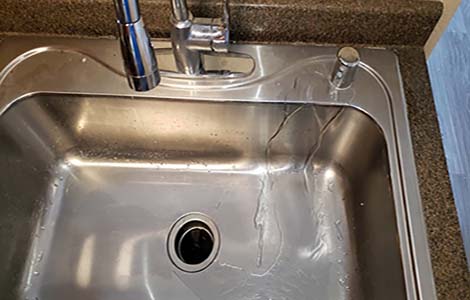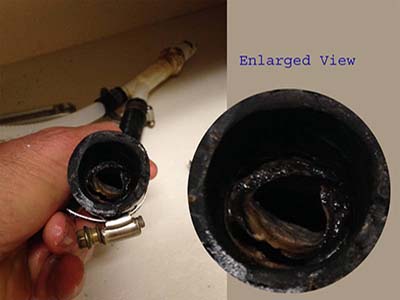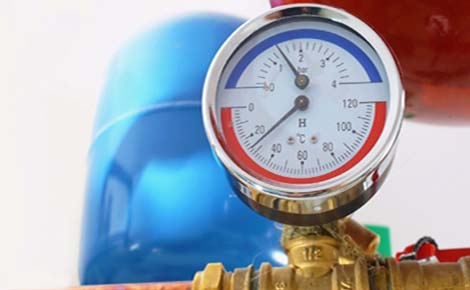Understanding the Dishwasher Air Gap
What Is a Dishwasher Air Gap?
Before diving into the causes and solutions for leaky dishwasher air gaps, it is important to understand what a dishwasher air gap is and what role it plays in your kitchen’s plumbing. A dishwasher air gap is a critical component of your kitchen plumbing system. It consists of a cylindrical fixture typically mounted on the countertop or sink deck. This fixture is connected to two hoses: one from the dishwasher and one from the garbage disposal or sink drain. The main purpose of the air gap is to create an air break and prevent wastewater from the dishwasher from flowing back into your fresh water supply.

The Role of the Air Gap in Dishwasher Drainage
The dishwasher air gap is an important safety feature. When the dishwasher is drained, water and dirt are expelled through the drain hose. The air gap provides a physical gap between the dishwasher drain line and the sink drain system.
This separation ensures that there is no cross-contamination between the wastewater from your dishwasher and the potable water supply used for cooking and drinking. In essence, the air gap acts as a barrier to safeguard your home’s water quality.
Common Causes of Dishwasher Air Gap Leaking
While the dishwasher air gap is a crucial component for preventing contamination and maintaining water quality, it can sometimes develop leaks. Several factors can contribute to air gap leaking, including:
Loose or Damaged Hoses
One of the most prevalent causes of air gap leaking is loose or damaged hoses connected to the air gap. Over time, the hoses may degrade, develop cracks, or become disconnected, allowing water to escape and create leaks.
Clogged Air Gap
Another common problem is a clogged air gap. Over time, dirt, soap scum, food residue, or mineral deposits can build up in the air gap, restricting water flow and causing backlogs and leaks.
High Water Pressure
Excessively high-water pressure within your plumbing system can overwhelm the air gap and cause it to leak. Elevated water pressure can exert undue stress on the air gap components, resulting in leaks.

Incorrect Installation
Improper installation of the dishwasher air gap is also a potential cause of leaking. If the air gap is not mounted at the correct height or connected incorrectly, water may not flow as intended, leading to leaks.
How to Diagnose Air Gap Leaks
If you suspect that your dishwasher air gap is leaking, it’s essential to diagnose the issue promptly. Here are some steps to help you identify the source of the problem:
Visual Inspection
Start by conducting a visual inspection of the air gap. Look for any signs of water dripping or pooling around the air gap fixture. If you notice water stains or moisture, it’s an indication that there may be a leak.
Running a Test Cycle
To further diagnose the issue, run a dishwasher cycle and closely monitor the air gap during the draining phase. If you observe water overflowing from the air gap or leaking from its components, you likely have an air gap problem that needs attention.
Fixing Dishwasher Air Gap Leaks
If you’ve identified that your dishwasher air gap is leaking, you’ll want to take appropriate steps to address the issue. Below, we’ll explore the common causes and corresponding solutions to fix air gap leaks:
Causes and Solutions of Dishwasher Air Gap Leaks:
1. Loose or Damaged Hoses:
- Cause: Over time, the hoses connected to the air gap can become loose, damaged, or come loose, allowing water to leak.
- Solution: Inspect the hoses and tighten or replace them as needed. Properly secured and undamaged hoses are essential for preventing leaks.
2. Clogged Air Gap
- Cause: Cause: Over time, dirt, soap scum, food residue, or mineral deposits can build up in the air gap, restricting water flow and causing backups and leaks.
- Solution: To resolve clogs, remove the top cap of the air gap fixture, access the interior, and clean it thoroughly. Clearing these blockages should restore proper water flow and prevent leaks.

3. High Water Pressure:
- Cause: Excessively high water pressure within your plumbing system can overwhelm the air gap and cause it to leak. Elevated water pressure can exert undue stress on the air gap components, resulting in leaks.
- Solution: Consider installing a pressure regulator in your plumbing system to maintain a safe and consistent water pressure level. This reduces the risk of leaks and protects your appliances.
4. Incorrect Installation:
Cause: Excessively high water pressure within your plumbing system can overwhelm the air gap and cause it to leak. Elevated water pressure can exert undue stress on the air gap components, resulting in leaks.
- Cause: Improper installation of the dishwasher air gap, such as mounting it at the wrong height or connecting it incorrectly, can cause water to not flow as intended, leading to leaks.
- Solution: Solution: Make sure your dishwasher’s air gap is installed correctly, following the manufacturer’s guidelines. Proper installation, including proper height and secure hose connections, will significantly reduce the risk of leaks..
Preventive Measures
Prevention is often the best approach to avoid dishwasher air gap leaking. Here are some preventive measures you can take to keep your dishwasher and air gap in optimal condition:
1. Regular Maintenance:
- Action: Perform regular maintenance on your dishwasher and air gap. Cleaning the air gap and hoses periodically can help prevent clogs and buildup, reducing the likelihood of leaks.
2. Best Practices for Dishwasher Use:
- Action: Practice proper loading techniques when using your dishwasher. Avoid overloading it, as overcrowded dishes can obstruct water flow and potentially lead to drainage issues. Additionally, scrape off excess food from dishes before placing them in the dishwasher to minimize the risk of debris buildup.
3. Monitoring Water Pressure:
- Action: Regularly monitor the water pressure in your home. If you notice consistently high water pressure, consider installing a pressure regulator. Regulating water pressure can protect your plumbing system and appliances from potential damage.
When to Seek Professional Help
While many dishwasher air gap leaks can be resolved through DIY troubleshooting and solutions, there are instances where it’s best to seek professional help. If you’re unsure about your ability to fix the problem or if the issue persists after attempting solutions, it’s time to call a dishwasher repair expert.
This section now includes both the causes and corresponding solutions for fixing dishwasher air gap leaks, providing a comprehensive guide for readers.
Preventive Measures: Prevention is often the best approach to avoid dishwasher air gap leaking. Here are some preventive measures you can take to keep your dishwasher and air gap in optimal condition:
Regular Maintenance: Perform regular maintenance on your dishwasher and air gap. Cleaning the air gap and hoses periodically can help prevent clogs and buildup, reducing the likelihood of leaks.
Best Practices for Dishwasher Use: Practice proper loading techniques when using your dishwasher. Avoid overloading it, as overcrowded dishes can obstruct water flow and potentially lead to drainage issues. Additionally, scrape off excess food from dishes before placing them in the dishwasher to minimize the risk of debris buildup.
Monitoring Water Pressure: Regularly monitor the water pressure in your home. If you notice consistently high water pressure, consider installing a pressure regulator. Regulating water pressure can protect your plumbing system and appliances from potential damage.